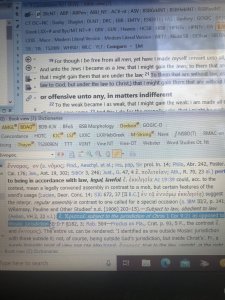I want to address a form of evasion that I believe some are engaging in. When challenged, they will respond with material, often a lot of it, that effectively avoids dealing with the challenge.
Let me be more concrete with an example:
I (who believe the 10 no longer apply) have argued that Romans 3:20 - that declares that the law gives knowledge of sin - describes what was true before the cross. Central to my argument is that right after verse 20, we get this:
But now apart from the Law the righteousness of God has been revealed....
My point is that the "but now" clearly indicates a transition from what was the case to what is now the case
When someone responds to this argument, they must, repeat must, at least in order to be credible, be able to complete this sentence:
"Therefore, the "but now" in verse 21 does not leave verse 20 in the past because.....<insert reasons>."
Do you see what I mean? Unless the respondent can complete this sentence, they are evading the challenge I have posed.
This works both ways. And I have risen to this challenge with respect to Romans 3:31 by posting variations of this:
The establishment of the Law in verse 31 need not entail believing the law remains in force because to "establish the law" can plausibly entail endorsing its indispensable role in God's broader redemptive plan without committing to the position that the Law remains in force.
Arguments need to be engaged in their own terms. Often posters will provide arguments that may have their own merits but that do not actually deal with the specifics of the text they have been challenged with.
The issue here regardless what camp one finds themselves in is Most are unteachable because of thinking they know something and or if one has perceived themself intelligent. And we all want the arguments to be in our own terms. Anyway….
Faith establishes the Law, validates, reinforces, upholds, maintains, causes to be steadfast, brings. This is what the Greek word histemi (establishes) brings out.
Let’s look at two things. First, how has Paul used and uses the Greek word translated establish in Romans 3:31 and throughout. It is the verb histemi as you know. It is in the present active indicative 1st person plural in verse 31. So to answer your question, ”
Therefore, the "but now" in verse 21 does not leave verse 20 in the past because.....<insert reasons>." Because We establish the law through faith is being stated as a fact in the present tense. An on going process that is indicative to us who possess the Faith in which is being spoken of.
Now for the second. Which also answers your question above. What is this Faith that establishes, maintains, brings about the law continuously?
Paul says in Romans 1:7 it is what the just live out of. And verse 1:5 states that grace is given for obedience to this faith. Which means Faith is something that needs obeyed and it is something which the just live by.
Then if we skip to 3:20-22 we see that none are justified by the law but by faith. We are not made righteous, justified through the law. We never were. As 1:17 stated the just shall live out of faith. Which is a quote from Hab. 2:4. Which means This fact was established in the old dichotomy prior to the New Covenant. Because of that fact now through Christ the righteousness of God is being manifested without the Law but through the faith OF Jesus Christ INTO all and upon all them whom believe. This Faith that manifests the righteousness of God is of Christ and we are given it. This Faith that we now have that is INTO and upon all whom believe establishes, maintains, brings about the law continuously.
God through Paul drives this home in verses 10:6-8 in Romans where he Paraphrases Deut 30:10-14 which is in the present tense also. He says, say not in your heart, who shall bring Christ down from above or up from the deep. But what saith it, the word is nigh thee in thy heart and in thy mouth. That is the Faith in which we preach.
In other words the Faith that Paul perched is the word in the heart. What is interesting about Paul quoting Deut. 30 is that in those verses we find out what Paul meant by the word in verse 8 of chapter 10. Paul in referencing Deut. 30 we see that starting in verse 10 the word that is being spoken of that is in our hearts is the commandments and statutes written in the book of the law. This is all done through Christ. Which is why Paul uses Christ in His paraphrase of Deuteronomy. And as Hebrews states God has said, He gives His law into our hearts and in our minds. Heb. 8:10; 10:16.
And in respect to the Faith that Paul preached he wrote in Galatian 2:20. We are dead nevertheless we live yet not us but Christ lives in us and the life we now live in the flesh we live by the faith OF the Son of God whom gave himself for us. For he that has been baptized into Christ have put Christ. By His stripes we have been healed.


